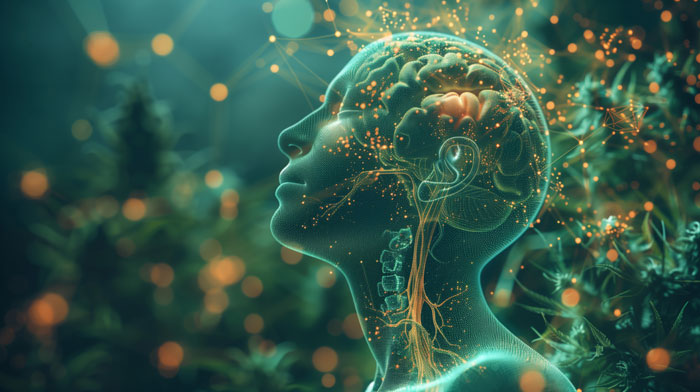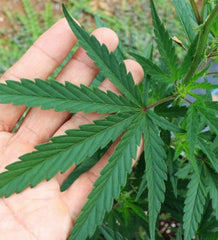
Does CBD help with irritable bowel syndrome?
Interaction between the intestinal microbiome and the endocannabinoid system
First of all, it is important to clarify that the microbiota is an ecological community of microorganisms found in every multicellular organism. This community is made up of bacteria, fungi, viruses, protists, etc.
According to studies conducted by experts in 2009, it should be noted that the central nervous system's ability to influence the microbiota is enormous. The same is true of the microbiota's influence on the brain and behavior.
It is precisely in the gastrointestinal tract that the microbiota influences the host. This ensures the maintenance of normal immune function of the mucous membranes. The same applies to the normal function of the epithelial barrier, its integrity, and the mobility and absorption of nutrients.
Failure in this action can eventually impair gastrointestinal function, which could subsequently lead to a propensity for disease.
According to studies conducted by professionals, it should be noted that stress or age can lead to changes in the composition of the microbiota, which would subsequently lead to enormous vulnerability to inflammatory stimuli in the gastrointestinal tract.
Although IBS is a microbial problem, the unequivocal link between microbes and the endocannabinoid system has yet to be identified. Currently, cannabis represents one of the best options available for managing this condition.
According to preclinical studies conducted in 2007, it should be noted that oral administration of a specific strain of lactobacillus induces the expression of opioid and cannabinoid receptors in intestinal cells.
The latter ingested analgesic functions in the intestine. These are precisely those that are similar to the effects of morphine on pain.
The use of cannabis for the treatment of symptoms of irritable bowel syndrome
In truth, there is no solid evidence linking cannabis to IBS. However, there are ways to use cannabis as a complementary treatment or even as a treatment.
Because CBD significantly improves the quality of life of people with this condition. Here's how cannabis can actually provide tremendous relief from the three main symptoms of IBS:
- Diarrhea: In individuals suffering from diarrhea-predominant irritable bowel syndrome, CBD has already proven its ability to provide crucial assistance in reducing hypermotility. It also helps reduce abdominal cramps. Hypermotility is generally observed when food passes quickly through the digestive tract. CBD, for its part, was the first treatment used against diarrhea caused by cholera in the 19th century;
- Pain: The analgesic properties of CBD are considered beneficial for patients with irritable bowel syndrome. This is because it significantly reduces visceral sensitivity in all those suffering from gastrointestinal disorders. In 2004, studies showed the effectiveness of the cannabinoid against intestinal diseases. Similarly, CBD has the ability to provide tremendous relief from nerve pain, as it has consistent anti-inflammatory properties. In other words, the cannabinoid has the ability to calm the sensitivity and inflammation of the intestinal mucosa to the maximum extent possible.
- Depression: The mental symptoms of irritable bowel syndrome are absolutely not to be ignored. According to studies conducted on rodents in 2016, it should be noted that cannabidiol can be considered a non-psychoactive component of cannabis itself. A single dose of the latter maximally and effectively reduces antisocial behavior. Similarly, it reduces anxiety-inducing behaviors within minutes. Hence its reputation for antidepressant properties.

What is the importance of the endocannabinoid system in gastrointestinal function?
The endocannabinoid system plays a key role in gastrointestinal function. This importance is due to the isolation of 2-arachidonylglycerol. By closely studying the role of vanilloid mechanisms, scientists have highlighted that anandamide is an endogenous agonist of VR1 receptors.
Furthermore, according to Pertwee's studies, it should be noted that the enteric nervous system of all mammals expresses the CB1 receptor. Stimulation of this receptor will cause a decrease in gastrointestinal motility.
In other words, this will be done by inhibiting the release of contractile neurotransmitters. Similarly, this company has also demonstrated that chronic intestinal inflammation can indeed lead to sensitization and upregulation of cannabinoid receptors.
Indeed, CBD would have a negligible effect on intestinal motility in itself. However, the latter will have a synergistic motility worthy of the name with THC. Likewise, it will provide crucial assistance in strengthening the regulatory effect.
Although studies have not yet been conducted, there is ample evidence that cannabis has a long history in the treatment of cholera, related disorders, and intestinal colic.
Based on all these claims, it must be suggested that endocannabinoids may represent the most promising therapeutic neuromodulatory target available. This is accompanied by phytocannabinoid treatments, which are believed to represent a much more effective therapeutic approach to date.
What are the effects of CBD on the body?
CBD is used today for its therapeutic properties, such as chronic pain relief. Aside from its anti-inflammatory properties, it also fights anxiety and depression.
Is CBD legal?
Of course, CBD is legal in all regions of France. However, there are certain standards that must be followed to ensure it doesn't cause side effects on the body.





